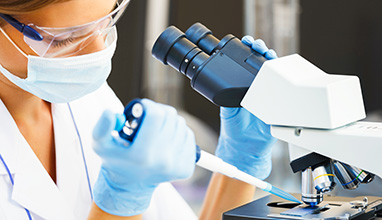The path toward a career as a histology technician varies according to the position being sought by the job candidate. Most forms of histology technician training consist of the completion of high school, a college program and certification requirements. Some individuals opt to further their education with more schooling in order to obtain a higher salary and position.
High School
As with many careers in the medical and science fields, a histology technician education begins with the completion of high school. Several high school courses are helpful in training for this career. Math and science courses are most beneficial to future histology technicians, particularly those that feature laboratory work. These can help prepare students for college level work. Computer courses are also important in a histology technician’s training. When dual enrollment courses with local community colleges are offered, students can take this opportunity to get a head start on their college careers through science and math classes as well. Teacher aiding for science instructors is also helpful.
Associate’s Degree
Most histology technicians complete their educational training in the form of an associate’s degree. This can be from an area technical school or community college. During this education, students can expect to study slide preparation, microscope use, writing reports and other relevant skills necessary in the histology technician profession. Computer science is often a focus along with biology, chemistry and other sciences. Students spend a large amount of time in a laboratory environment that may be similar to their work environment after graduation. This degree typically takes 2 years to complete and costs an average of $2,544 annually when students attend local colleges.
Bachelor’s Degree
Unless the student possesses a desire to eventually move upward into a higher scientific position, a bachelor’s degree is typically not necessary for this career. Some histology technicians do enroll in a 4-year program, however, to help them obtain further skills for upward mobility. They may even attend courses while simultaneously working in a lab. Medical laboratory science is a popular choice for a major along with biology and clinical laboratory science. Further laboratory practice is engaged in these programs. The cost of a bachelor’s degree averages $6,500 annually. Upon completion, a student may wish to become a full histologist or enter another science field.
Certification
Certification is strictly voluntary in the field of histology. This extra credential, however, does provide candidates with an additional level of credibility that employers look for in new hires. Certification can be obtained through the American Society for Clinical Pathology. Candidates should know that certification does require educational experience and the successful completion and passing of an exam. The education in question must be from a reputable, accredited university. Most people who take this exam must have a degree in histology. Various types of certification are available and cost around $225. Applications can be completed online.
There are entry-level histology technician positions that some high school graduates can obtain without further education. In these environments, on-the-job training suffices to prepare each individual for this line of work. Many laboratories, however, prefer candidates with more experience and educational background for hire.






